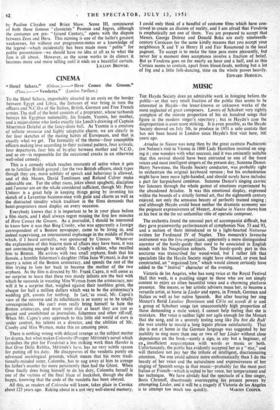CINEMA To the Hotel Sahara, improbably situated in an oasis
on the border between Egypt and Libya, the fortunes of war bring in turn the officers and N.C.O.s of the Italian, British, German and Free French armies. The staff of the hotel consists of a proprietor, whose tarboosh betrays his Egyptian nationality, his fiancee, Yasmin, her mother, and a major-domo who looks exactly like Leech's drawing of Captain Miserimus Doleful at the fancy-dress ball. As Yasmin is a creature of infinite resource and highly adaptable charm, we are clearly in for four sketches of the mating habits of Europeans, and that is. exactly what we get. The formality of the theme—four susceptible officers making love according to their national pattern, four arrivals, four departures, four bits of by-play between mother and N.C.O., and so on—is responsible for the occasional creaks in an otherwise well-oiled comedy. This is a comedy which reaches moments of satire when it gets on to familiar British ground ; for the two British officers, stock types though they are, more subtlety of speech and behaviour is allowed, and of this Messrs. David Tomlinson and Roland Culver make admirable use. For the other races, jokes'about spaghetti, discipline and l'amour are on the whole considered sufficient, though Mr. Peter Ustinov is a great help in keeping things going by investing his sketch of a Levantine business-man with guile and charm as well as the distracted timidity which tradition in the films demands that hotel-proprietors must display on every occasion. Everybody knows that it is important to be in your place before a film starts, and I shall always regret missing the first few minutes of Here Comes the Groom. As a journalist, I should be interested to know how it was that Bing Crosby, who was apparently a foreign correspondent of a Boston newspaper, came to be living in, and indeed supervising, an international orphanage in the middle of Paris which, if I heard correctly, was sponsored by Unesco. Whatever the explanation. of this bizarre state of affairs may have been, it was not convincing enough to satisfy Mr. Crosby's editor, .who recalled him to Boston. He. arrives with two small orphans, finds that his fiancée, a humble fisherman's daughter (Miss Jane Wyman), is due to marry a scion of the Boston aristocracy, and spends the rest of the film trying to lure her back to become the mother of the two orphans. As the film is directed by Mr. Frank Capra, it will come as no surprise to learn that these two sturdy infants are the bait with which he succeeds in weaning Miss Wyman from the aristocracy, nor will it be a surprise that, weighed against their toothless grins, the cheque for half a million dollars which was to be the aristocracy's wedding gift, counts for nothing. In fact,' as usual, Mr. Capra's view of the universe and its inhabitants is so sunny as to be totally unrecognisable. He can't even really bring himself to hate the Boston aristocrats, and must insist that at heart they are just as quaint and uninhibited as journalists, fishermen and other riff-raff. When Mr. Capra's cosy approach to this little old world of ours is under control, his talents as a director, and the abilities of Mr. Crosby and Miss Wyman, make this an amusing piece.
There is nothing wrong with delayed revenge as the subject matter for drama, but what makes Colomba (Prosper Merirn6e's novel which furnishes the ,plot for Vendetta) a less striking work than Hamlet is that Orso Della Rebbia, Merimee's hero, has no very-subtle reason for putting off his duty. He disapproves of the vendetta purely on advanced sociological grounds, . which means that his more tradi- tionally-minded sister, Colomba, has to nag away at him to avenge his father's murder far more persistently than had the Ghost. When Orso finally does bring himself to do his duty, Colomba herself is one of the victims of the final blaze of buckshot, though she dies happy, knowing that the code of the vendetta has been obeyed. All this, as readers of Colomba will know, takes pia& in Corsica about 125 years ago. Raking about in a not very well-stored memory, I could only think of a handful of costume films which have con- trived to create an illusion of reality, and I-am afraid that Vendetta is emphatically not one of them. You are prepared to accept that Messrs. George Dolenz and Donald Buka are early nineteenth- century Corsicans for the same kindly reasons that you accept your neighbours X and Y as Henry II and Fair Rosamond in the local pageant. To accept is to make the time pass more pleasantly, but never for a moment does acceptance involve a fraction of belief. But as Vendetta goes on for nearly an hour and a half, and as this Corsica seems to contain, apart from blood-feuds, nothing but a lot of fog and a little folk-dancing, time on the whole passes heavily.
EDWARD HODGKIN.






































 Previous page
Previous page